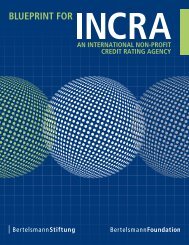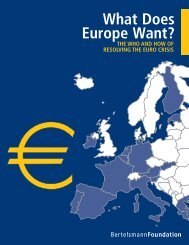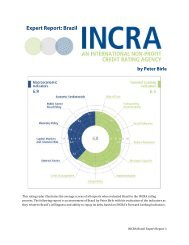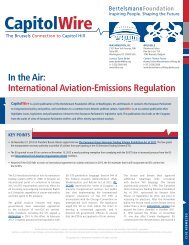identifying the agents most qualified totransmit those messages. A robust trans-Atlantic energy and climate dialogue willsend strong signals to third countries,such as China and India.1. Reinvigorate the US-EU EnergyCouncil and re-define topics fordiscussion in the Working Groups tocover issues of strategic importanceto both trans-Atlantic partners:The council was launched in 2009 asan official dialogue forum to “promotenew and ongoing cooperation on energysecurity and markets, energy policy,energy technology research.” 16 Yetsince its launch, it has suffered froma growing indifference among US andEuropean leaders alike. In light of thepressing issues outlined above, the USand the EU need a forum that will havehigh policy significance to both parties.The US should use a reinvigorating ofthe council to send positive signals toEurope and to reassert its relevancein international climate and cleanenergy politics. This can be done inseveral ways:a) Include shale gas in the council’senergy security working group: Onearea of discussion should focus on theenvironmental and economic impactassessment of shale gas extraction, asthis is an area of significant interestto both parties with an impact on theincreasingly globalized gas market.International energy experts arepredicting a sharp increase in naturalgas production through mid-century. Yetthe current discussion around shale gason both sides of the Atlantic remainshighly divergent.b) Use the same working group toencourage Europe to build LNG importfacilities for US gas imports: Northernand Mediterranean Europe are preparingfor the import of liquefied natural gas(LNG) from abroad, and diversifyingimport routes with new LNG terminalscurrently under construction in Poland,France and Spain. As Europe has thepotential to become a reliable importerof US LNG, it is in the US’s interestthat European import terminals aredeveloped accordingly (and US exportterminals likewise). In addition, the USshould recognize that the successfulconclusion of a free trade agreement(FTA) with the EU will have substantialstrategic implications for EU energysecurity. Currently, gas exports aresubject to a tedious interagency reviewprocess that makes export to Europeprohibitive. An FTA would expedite theLNG export permitting process at theUS Department of Energy and builda stronger energy trade relationshipacross the Atlantic.c) Use the council as an instrumentto strengthen competitiveness: Themultiplier effect of developing commonUS-EU technology standards forrenewable energy or energy efficiency iswidely recognized. Even though this wasthe initial objective of the US-EU EnergyCouncil, little progress has been made.One way to start this process would beto coordinate and develop a technologyroad map. This would have a positiveimpact on trans-Atlantic trade of energyefficientappliances and batteries, aswell as renewable energy technologies.Particularly with regard to appliances,a trans-Atlantic labeling system couldboost the competitiveness of bothEuropean and American products.Both sides should also agree that onlythe most efficient products should beeligible for public procurement.d) Add a high-level strategy task forceto the council structure: This task forcewould be able to quickly consider issueswith potential severe and immediateeffect on trans-Atlantic relations, suchas the issue of including US airlinesunder a EU-ETS or the impact of the EU’sFuel Directive on shale oil imports fromthe US. The task force should consist ofthe US secretaries of state and energyand the US trade representative, as wellas the EU commissioners of energy,environment, climate action and trade.2. Eliminate tariffs and otherbarriers on trans-Atlantic trade ofenvironmental goods and servicesto promote exports, create jobsand advance green growth andsustainable development:Most such tariffs are low already (around4 percent), and eliminating them wouldhave immediate positive consequencesfor trans-Atlantic investment flowsand market access, jobs and companyprofits. This could be done prior to theapproval of a TAFTA by establishing anEnvironmental Goods List, similar tothe one established under the Asia-Pacific Economic Cooperation (APEC)in September 2012. Such a list shouldinclude core environmental products,such as renewable and clean energies,wastewater treatment technologies,air pollution control technologies,and environmental monitoring andassessment equipment.3. Work closely with the EUon means of creating greatertransparency and accountabilityin extractive industries:In recent years, throughintergovernmental projects such asthe Extractive Industries TransparencyInitiative (EITI), both the US and EUhave been active in reforming themodels of corporate behavior of oil,gas and mining industries at home andabroad, particularly in countries withweak institutions.In the US, the Dodd-Frank overhaul ofthe financial regulatory system containsa number of transformative measuresthat will deeply affect US economicdiplomacy. One of its most innovativepolicy provisions was the Cardin-Lugaramendment (Section 1504), a provisionaimed at making payments made byextractive industries to governmentsabroad and at home more transparent.Together, the EU and US laws have the potentialto transform the way business is done in extractiveindustries and help emancipate developing countriesfrom the so-called “resource curse”.5 4Energy & Climate Change
Section 1504 could fundamentallytransform the way that US-listed oil, gasand mining companies operate in thirdcountries. The regulation stipulatesthat all such companies publicly listedon the New York Stock Exchange willbe required to annually disclose to theSecurities and Exchange Commission(SEC) all payments made to national,state and local governments on aproject-by-project basis. A modulardatabase of these disclosures willserve civil society groups who monitorthe flow of money to governments inan effort to dry up the dark financialpools that fund endemic corruptionin many resource-rich countries. Thepromulgation of rules by the SEC inAugust 2012 sets the stage for a newbusiness culture between extractiveindustries and payments made to publicinstitutions and officials. The EuropeanCommission, for its part, has introducedamendments to the Accounting Directiveand Transparency Directive that wouldreplicate the provisions of the Cardin-Lugar amendment. It is currently undernegotiation among the Commission,the European Parliament and memberstates, and the Parliament is expected tovote on it in early 2013.The US and EU should work togetherto guarantee that the implementationof Section 1504 and the revisedTransparency and AccountingDirectives creates a robust regimethat allows payment tracking and hascomplementary project definitions,payment thresholds and exemptionsso that the laws are not subject toregulatory arbitrage. They should consulton disclosure practices to make surethat they are interoperable across theAtlantic and can be swiftly implementedand enforced in the coming years.Together, the EU and US laws have thepotential to transform the way businessis done in extractive industries and helpemancipate developing countries fromthe so-called “resource curse”.4. Highlight the US’s domesticclimate/energy successes to aEuropean audience by engaging ina more active trans-Atlantic publicdiplomacy:European policymakers and citizenstend to neglect the US’s progress onenergy issues and view it as an obstacleto international climate negotiations.Often this view is fostered by one-sidedmedia coverage in Europe. There is astrong need for reshaping the narrativeby developing media engagement plans;Europe has already done this, and theUS should follow suit. An annual trans-Atlantic media dialogue could invite keyEuropean economic reporters to the USto report on some of the positive climate/energy stories happening at the stateand local levels. Potential focus areasinclude the greening of the US military,the recent EPA greenhouse gas limitsfor new power plants, or the greenhousegas emissions system in California. USembassies throughout Europe shouldfollow up regularly with journalists andnetwork with European media outlets.Embassy staff should also acquire betterknowledge of some of the progressiveenergy/climate trends now seen inthe US.5. Agree on new visa provisionsthat allow US businesses to attractand recruit graduates withadvanced degrees in science,technology, engineering andmathematics (STEM):As progress on climate and energypolicy is always subject to technologicaladvancement, there is also an increasedneed for further trans-Atlanticcooperation in climate science andenergy technology research. TheUS should actively strengthen thecooperation on these issues betweenUS and European research universities,labs and companies by making it easierfor recent European graduates from USinstitutions to gain US work permitsand visas that last longer than the oneyear allotted to F-1 visa holders. A socalled“start-up visa” should be madeavailable to foreign energy/climateentrepreneurs to allow for the necessaryplanning security. 17 5 5Energy & Climate Change
- Page 3: Field Manual to EuropeIntroduction
- Page 6: multilateral channels. Europeanshav
- Page 9 and 10: JuneBritish presidency of UNSCJune
- Page 12 and 13: US-EU Investment vs. Global Nationa
- Page 14 and 15: economic conditions in the eurozone
- Page 17 and 18: MEMO ONTHE EUROZONE CRISISThe State
- Page 19 and 20: attitude toward moral hazard. Withw
- Page 21 and 22: Greece: 2010 Bailout BreakdownGreec
- Page 23 and 24: the deficit from 4.5 percent to thr
- Page 27 and 28: NATO thus faces an uncertain future
- Page 29 and 30: 1. Consider NATO’s defensespendin
- Page 31 and 32: of-area operations and worldwidepar
- Page 33 and 34: concurrent terrorist attack in Beng
- Page 35: 2. Strengthen regionalpartnerships
- Page 38 and 39: MEMO ONCOUNTERTERRORISM ANDHOMELAND
- Page 40 and 41: home affairs (JHA), particularly in
- Page 43 and 44: Status of EU Countries in the US Vi
- Page 45 and 46: offensive capability centered at NA
- Page 47 and 48: socialized, i.e. there is a tacit e
- Page 49 and 50: such technology, such as deep packe
- Page 51 and 52: MEMO ONENERGY & CLIMATE CHANGEThe S
- Page 56 and 57: MEMO ONTURKEYThe State of PlayTurke
- Page 58 and 59: as a rising regional and internatio
- Page 60 and 61: CASE STUDY: TURKEY’S ENERGY ROLE:
- Page 62 and 63: 22%12%Turkey’s Main Trading Partn
- Page 64 and 65: MEMO ONRUSSIAThe State of PlayIn Pr
- Page 66 and 67: EU-Russia security apparatus. Themo
- Page 68 and 69: greater market access for US busine
- Page 70 and 71: MEMO ONCHINAThe State of PlayIn 201
- Page 72 and 73: But China’s competitive meridian
- Page 74 and 75: in millions of USDUS-China Bilatera
- Page 76 and 77: 7 6Acknowledgements
- Page 78 and 79: CITATIONSINTRODUCTION1See “Confid
- Page 80 and 81: 20Castle, S. (17 September, 2011).
- Page 82 and 83: ARAB UPRISING1Koch, C. (summer 2011
- Page 84 and 85: COUNTERTERRORISM & HOMELAND SECURIT
- Page 86 and 87: 21Healey, J. (January 2012). Beyond
- Page 88 and 89: 20Berlemont, I. (25 July, 2012). Fr
- Page 90 and 91: 24Putin, V. (6 September, 2012). An
- Page 92: Bertelsmann Foundation1101 New York






